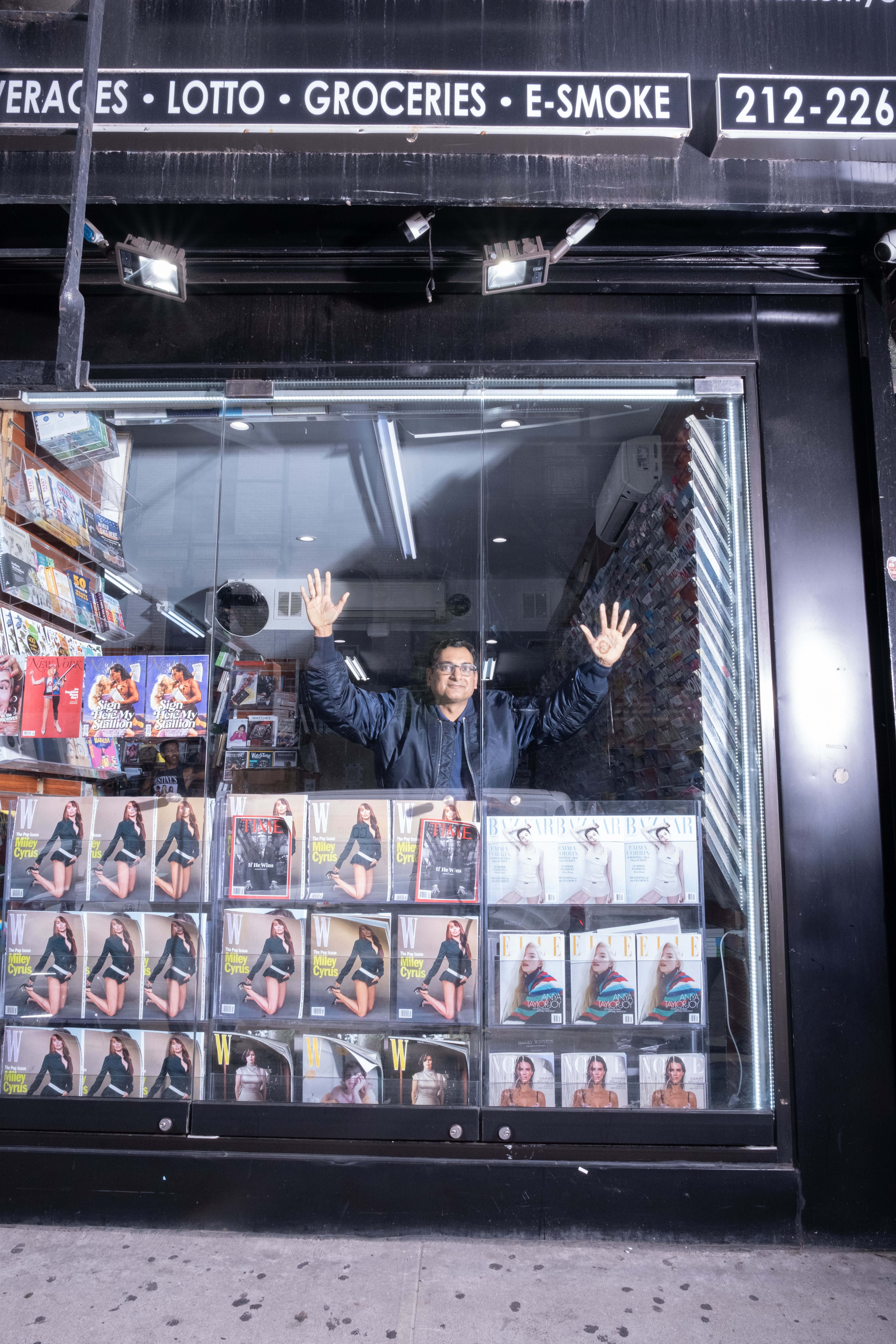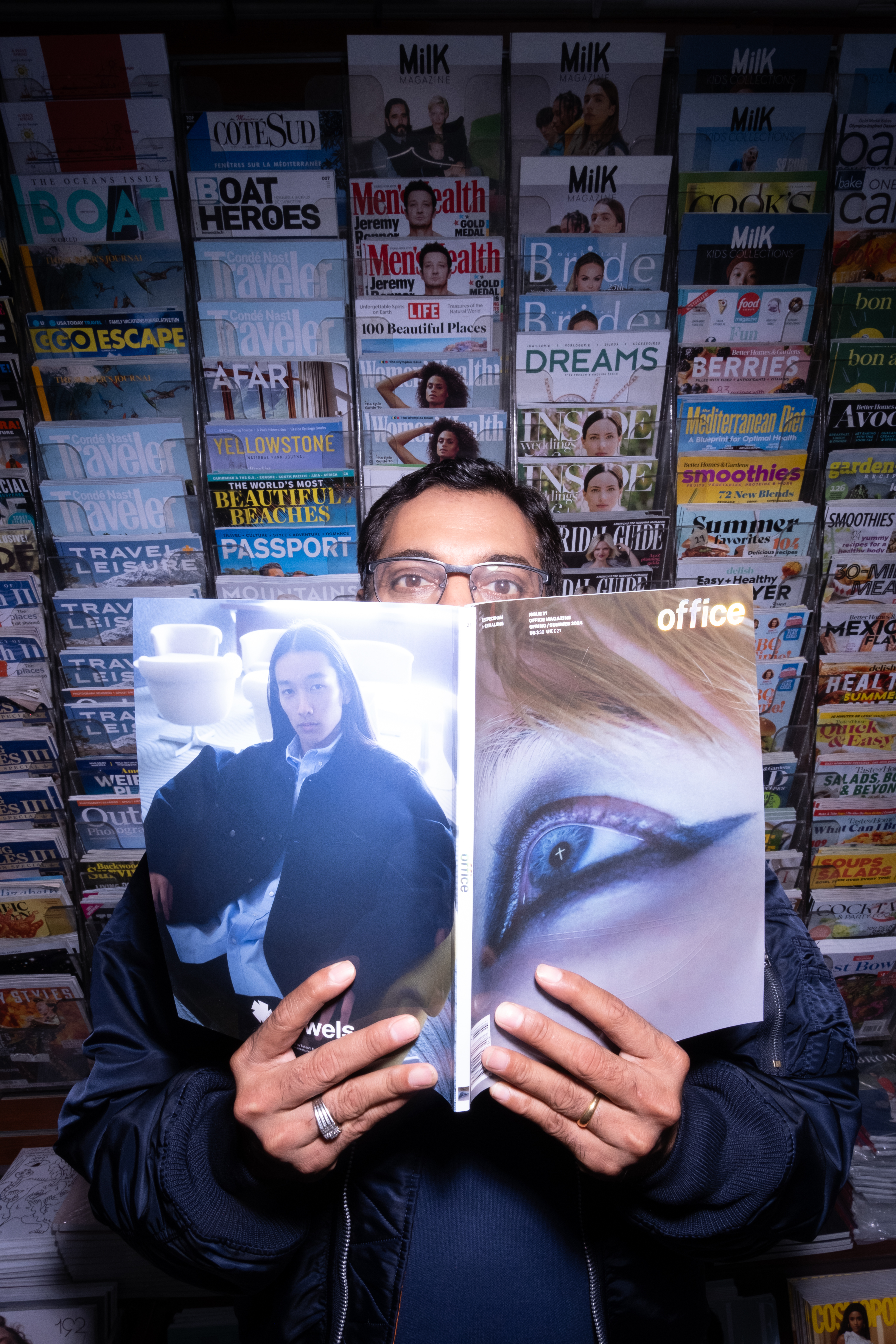Even Mike Pence Fucks
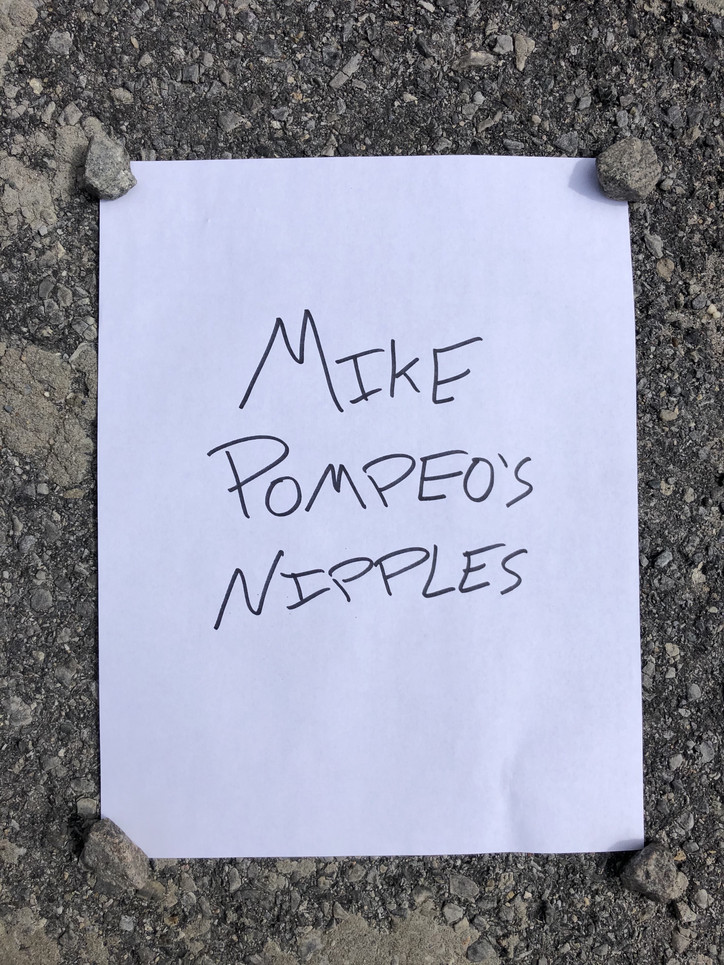
Read Gideon's two poems, "Mike Pompeo's Nipples" and "My 7 Minutes in Heaven with Steve Mnuchin," below.
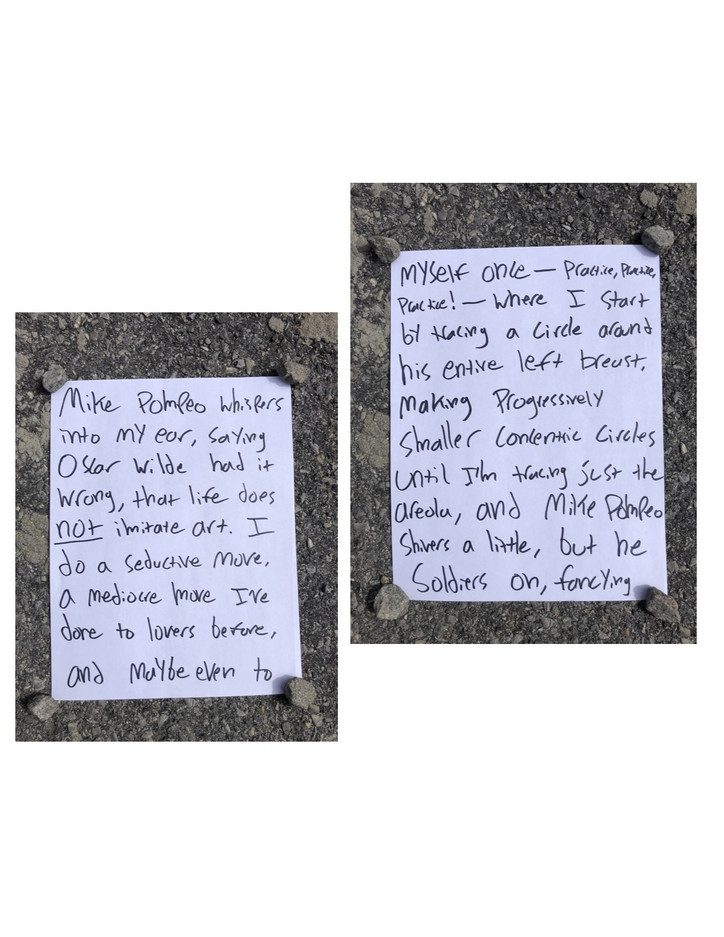
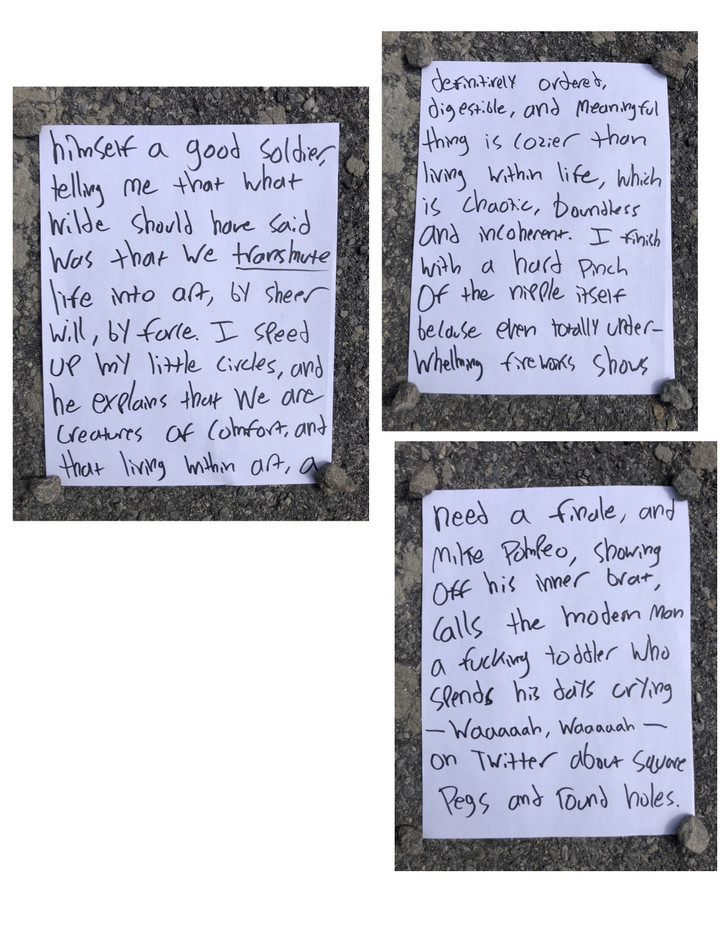
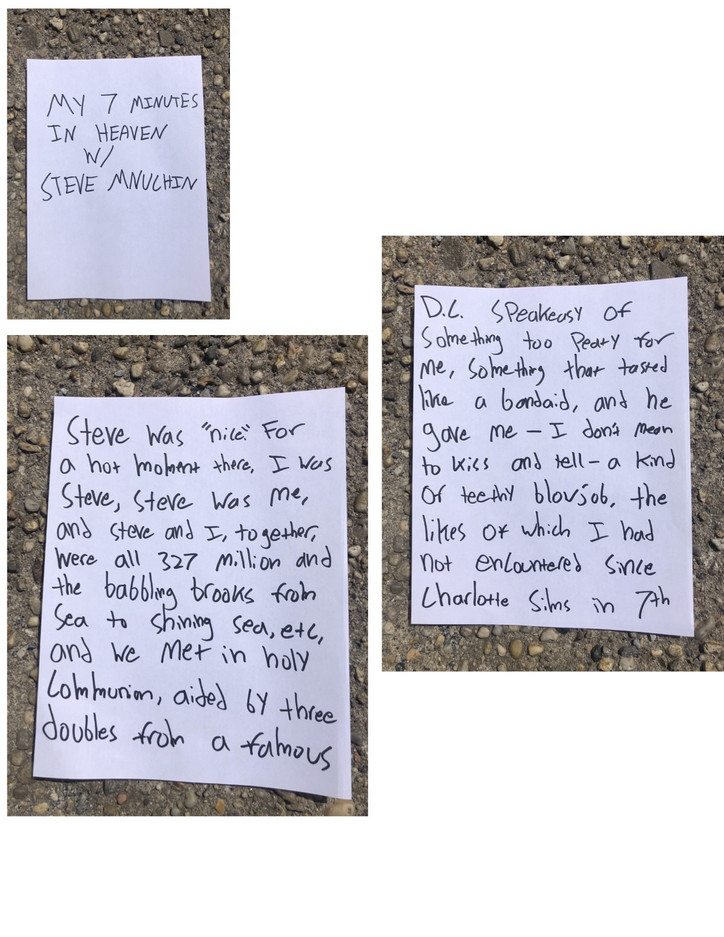
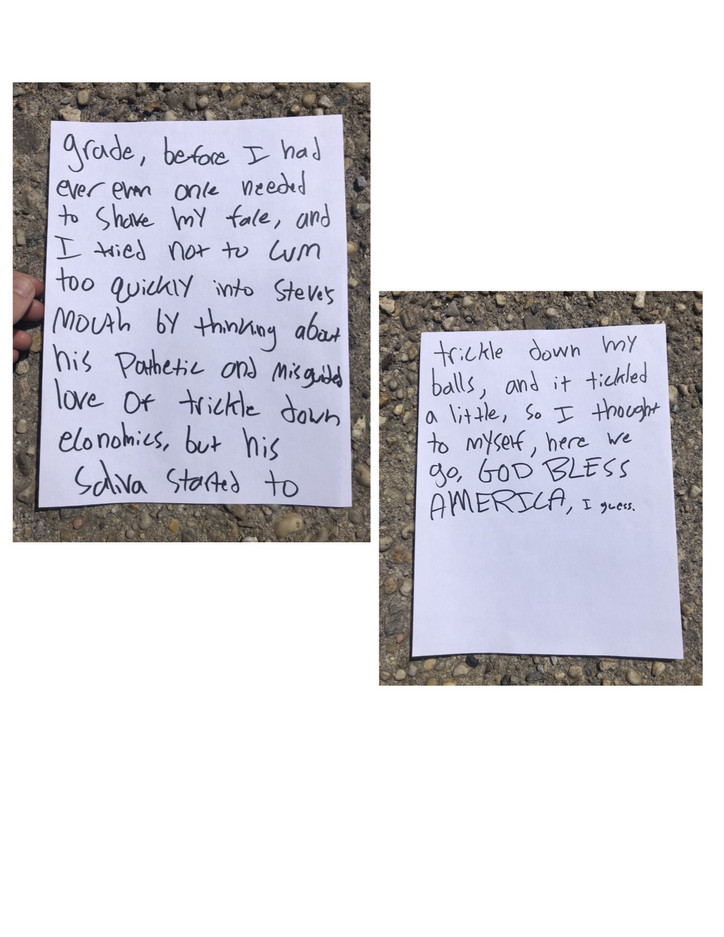
Stay informed on our latest news!

Read Gideon's two poems, "Mike Pompeo's Nipples" and "My 7 Minutes in Heaven with Steve Mnuchin," below.




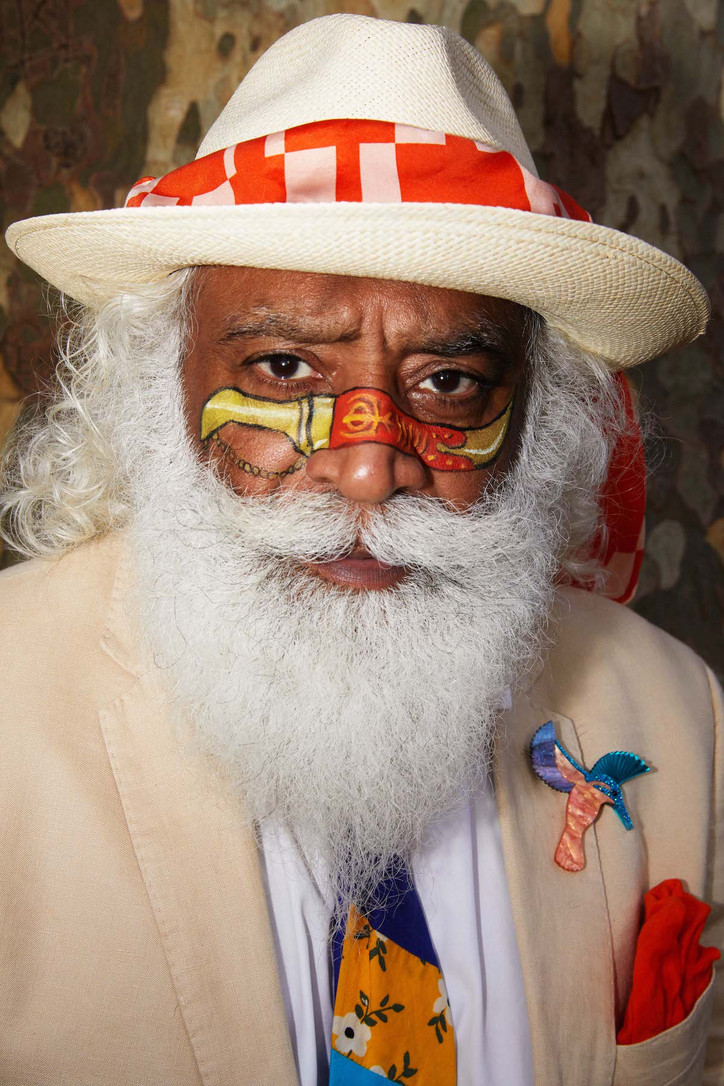
Where were you born?
Mile End hospital in London.
Where do you feel most comfortable?
East London.
What quality do you think defines you most?
Kindness.
What do you look for in a companion?
Divine love.
What is your biggest weakness?
Sugar.
What is your biggest strength?
Sikhi.
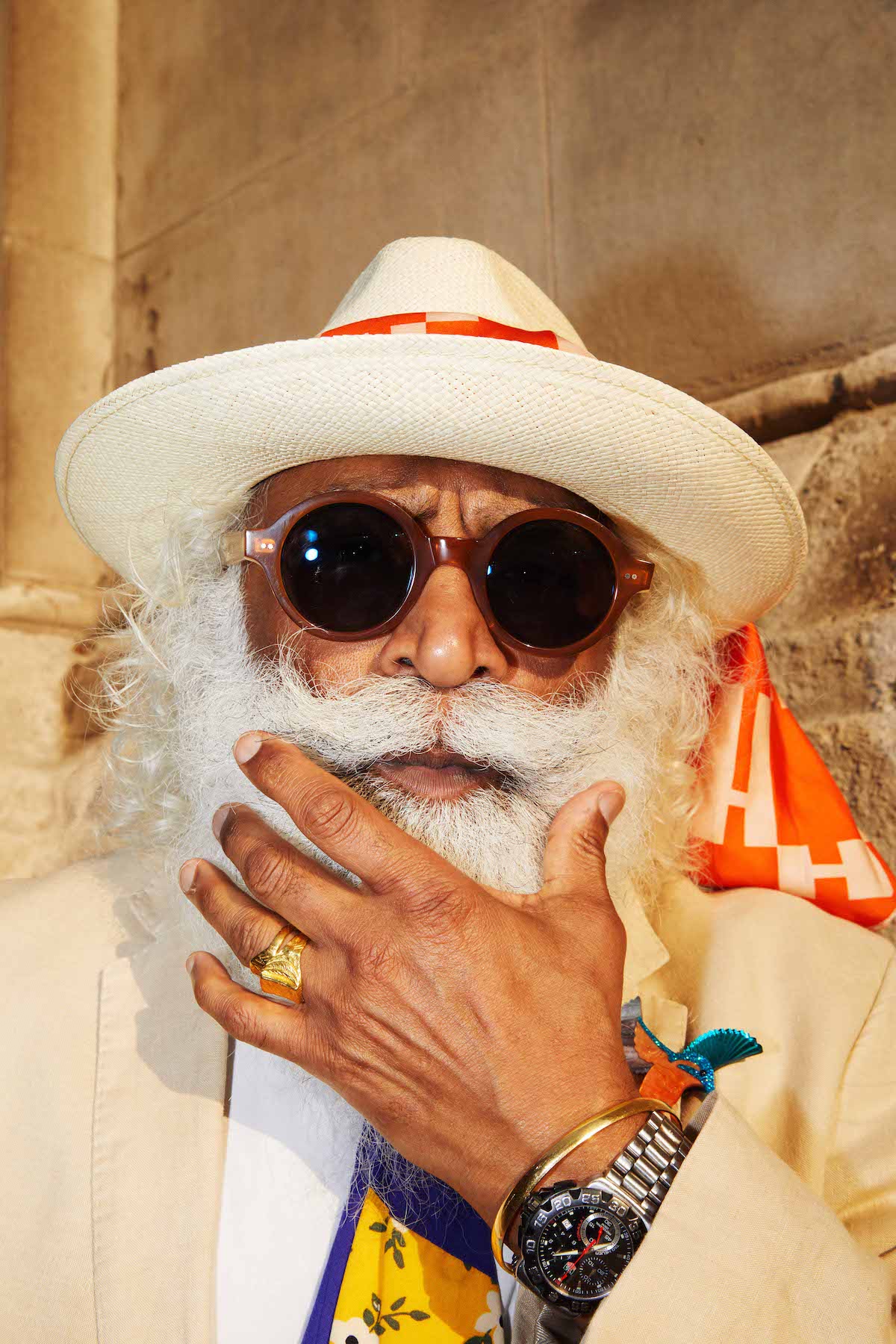
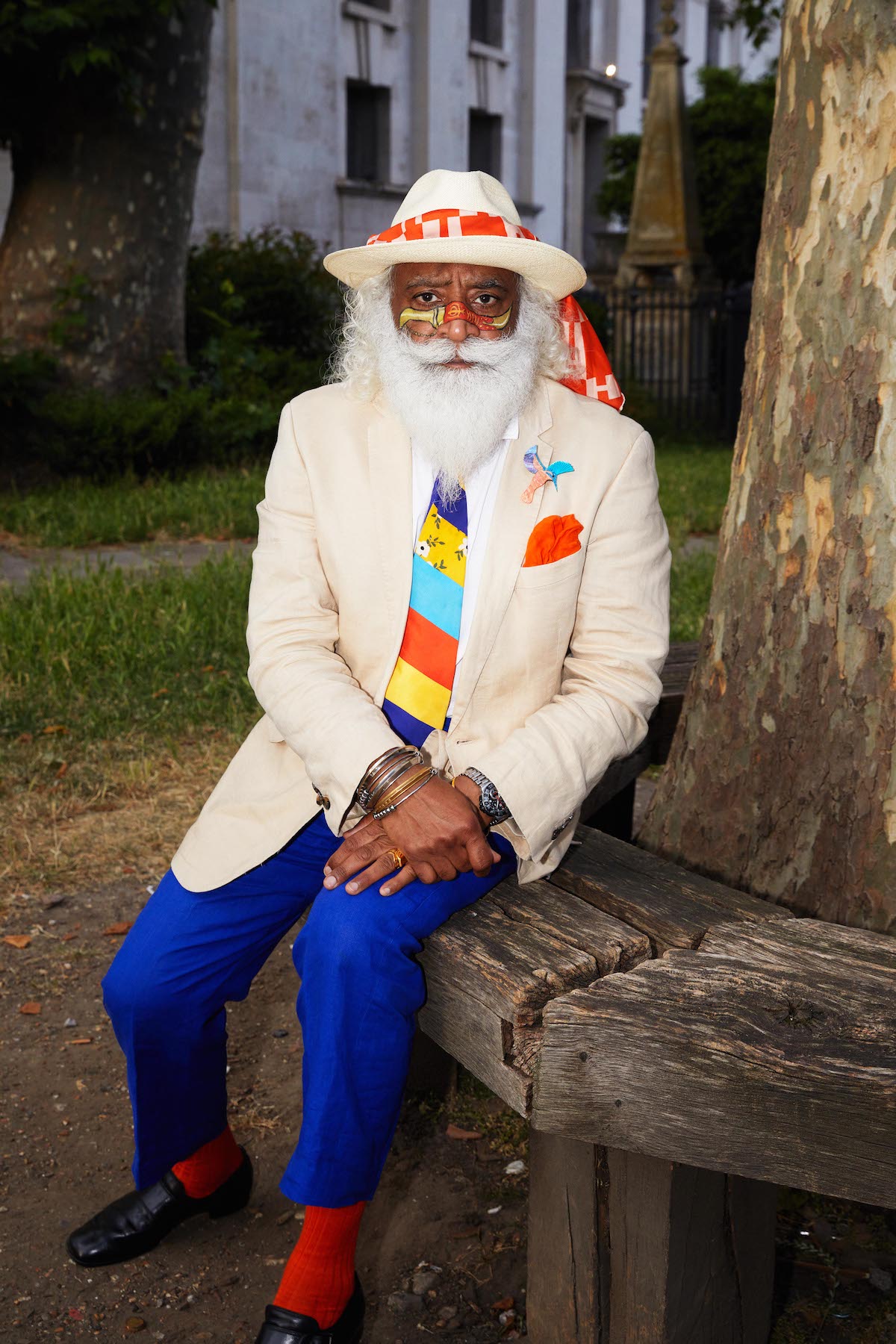
What has surprised you most in life?
My followers
What does your perfect day look like?
Sitting in our home
What is your favorite color?
Orange
Who are your favorite fictional characters?
Batman
Who or what is your biggest inspiration?
Guru Nanak ji
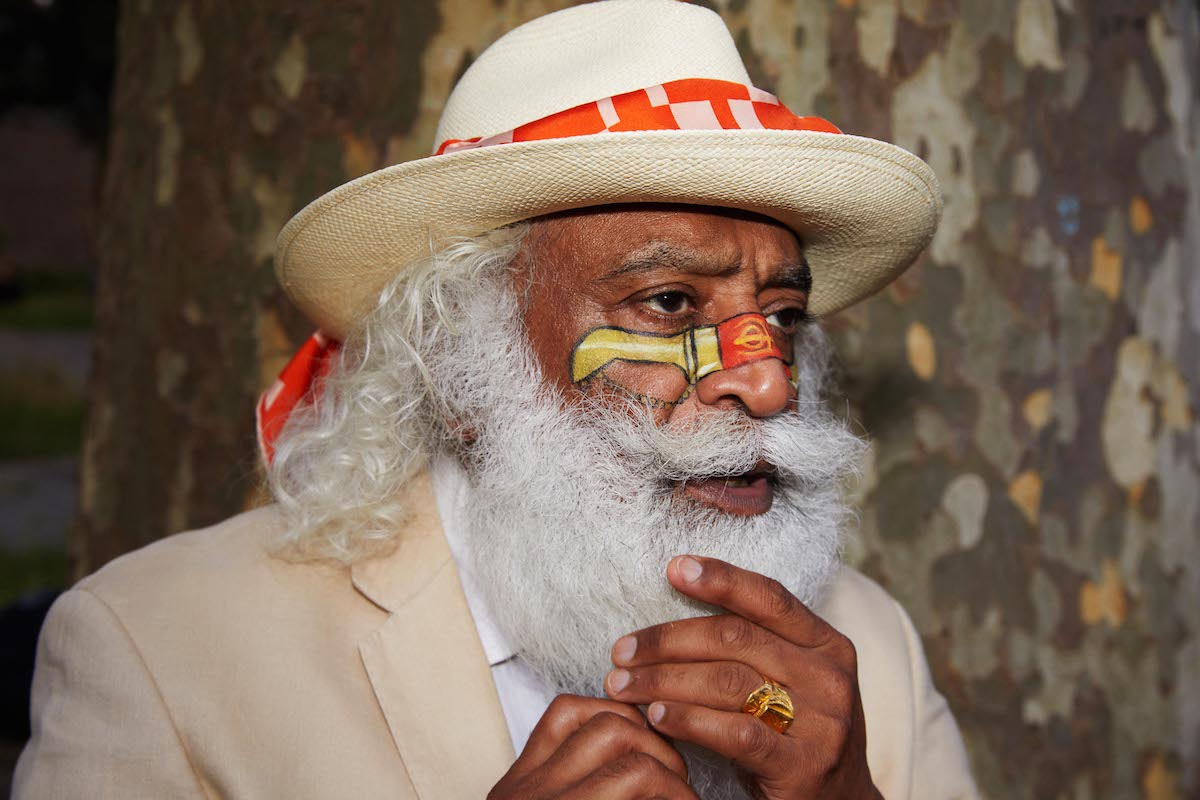
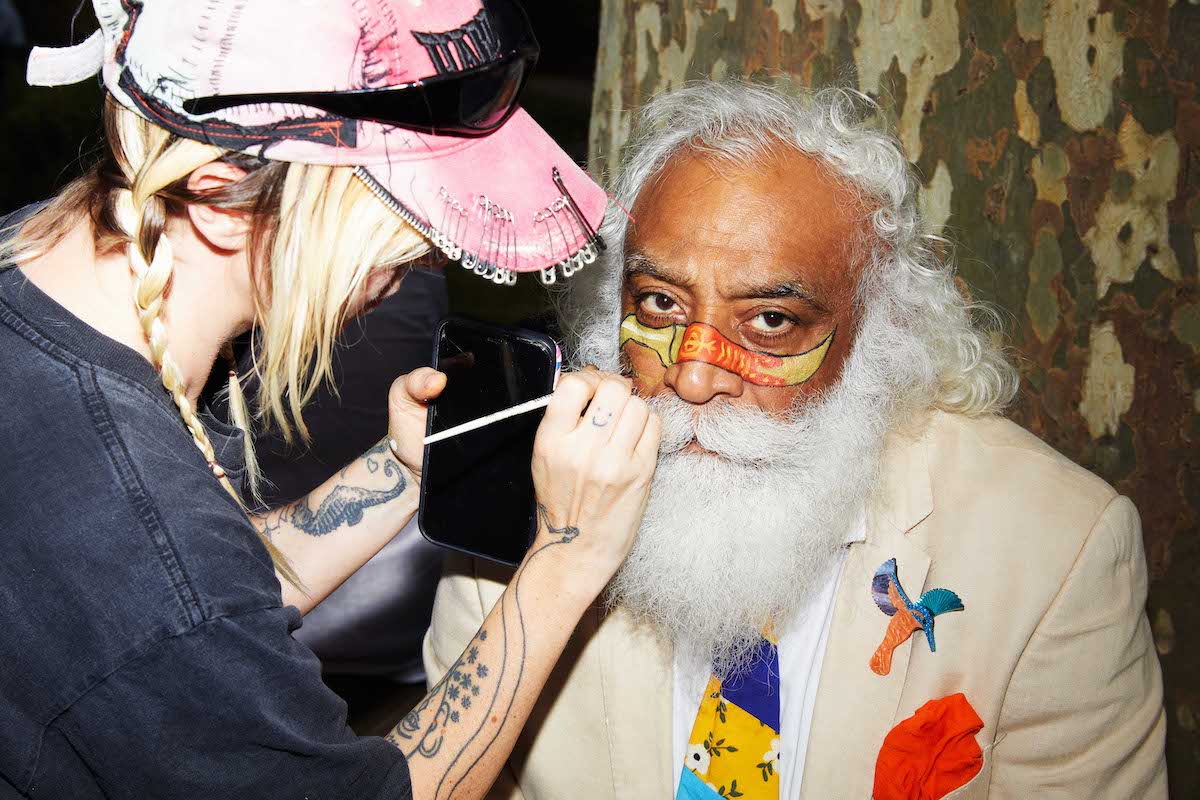
What is your favorite food?
Saag and yellow roti
What quality do you dislike most in someone?
Jealousy
What is your earliest memory?
Our house in Brick Lane E1
What is your biggest luxury?
Sicilian Lemonade
How do you show someone you love them?
Being kind
What is your biggest achievement?
Life
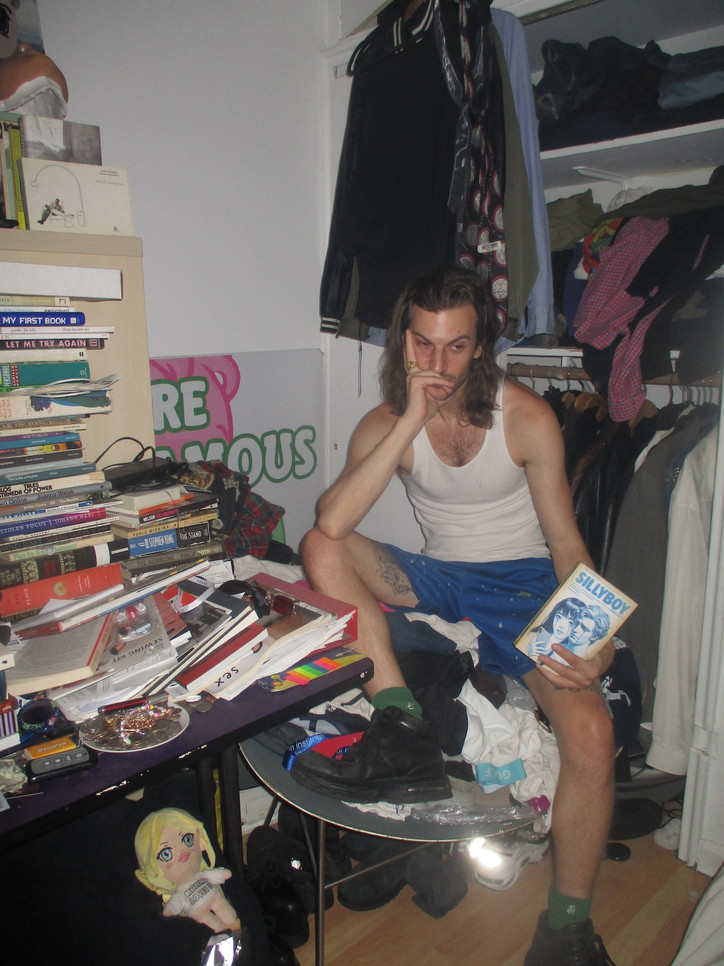
It’s funny — Peter originally read my review of his poem at the Car Crash Collective / Richard Hell reading and thought I was a hater. Before meeting him, I mixed him up with right-wing billionaire Peter Thiel. We’ve obviously put all this behind us. This interview is months in the making. We’ve had to work around the premiere of his film, www.rachelormont.com, and his audition tapes for the zealots.
Where’d the Jesus beard go?
Peter Vack — The Evangelicals googled me. I was their top choice until they found themasterofcum and Assholes.
Oh shit. Condolences.
It’s for the better. I might’ve gotten some hate for being associated with a company that advertises at the RNC.
The question of separating the art from the artist. Everyone’s been asking how much of Sillyboy is autobiographical. Does that get annoying?
It’s not annoying because it’s so expected. Now more than ever, people feel like they have to draw a connection between an author and protagonist. So I get it. The book even deals with that.
At one point you’re like, “Fiction is fiction.” But how many Jewish actor / writer / meme pages do I know?
A lot of this book is absolutely based on stuff from my life, but I don’t exactly love the mantle of autofiction. You spend so much time making something work as a story, so you do have to invent things. There’s too much emphasis placed on asking how a work relates to the life of an author.
That’s the mania right now — probably because of social media. We’re all given agency as creators. Even if you’re not a creative person, the template of social media is like, “Here, share your life with me.” It’s giving you this conduit for creation.
Anyone can be interesting.
Exactly. And that spurs that whole “main character syndrome” thing.
And now people are reading this as your biography. It probably doesn’t help that we’re friends. That may legitimize the book too much.
But if that’s people’s enjoyment of the book — to think that it’s all about me, then fine.
It is kind of scandalous to think we’re just reading your diary.
And if people want to love or hate that fact, that’s cool. Chloe, the girlfriend character, was originally based on someone I knew. But in writing anything, you imbue it with so much. So now, I feel like she’s taken on some characteristics of myself. When you’re writing a character, some of you leeches onto them.
I call it “semi-autofiction” because it’s certainly drawing from my life, but I’m also inventing things. People will think what they want. At the end of the day, it’s not up to me. They’ll hate or love this book with their own criteria. So be it.
All writing is, in some way, semi-autofiction. Because when you write, how do you not imbue yourself into the story?
I totally agree. People want to use artworks as a key to someone’s life. But it’s never that simple. It’s interesting, but it sometimes feels besides the point.
I think the obsession with trying to read into people’s lives comes from this yearning for the tabloids. We miss the days of E!News, where people were constantly getting their shit aired. Headlines like, “Kate Moss seen with powdered nose,” or whatever. Now people just post that.
People air their own shit.
I mean, you’ve seen my Instagram. There’s no secrecy or scandal anymore. Why do you think that is?
Why are we all over-sharing now? Because people are hungry for attention. And part of what I’m doing in the book is playing into that. Even just writing a book with a character that could be mistaken for me — who has some qualities that are unsavory or provocative — that’s me being a bit of an exhibitionist. I’m flirting with this playful idea of almost outing myself. Maybe it’s me, maybe it’s not me.
It's like leaking your own nudes.
Or tipping off paparazzi to your date. But that’s fun. I should probably start saying that Sillyboy is literally a memoir.
At Catie’s event where we both read, you had that line: “I deleted everyone who wasn’t the inspiration for Chloe in Sillyboy, so if you’re hearing this you’re Izzy Capulong now.” And Page clowned me after. Did I tell you that?
Oh yeah. I wanted to instrumentalize you to sell the book.
I don’t think me being involved with the book would make people want to buy it more.
But at that reading people would be. If you had a book in your hand and said, “This is about me,” I’d be like, “Wow, that’s really cool.”
I don’t think people are as interested in me as you think, but I appreciate that you think they’d be.
I think they’re soon to be as interested in you as I want them to be.
Aw. Thank you.
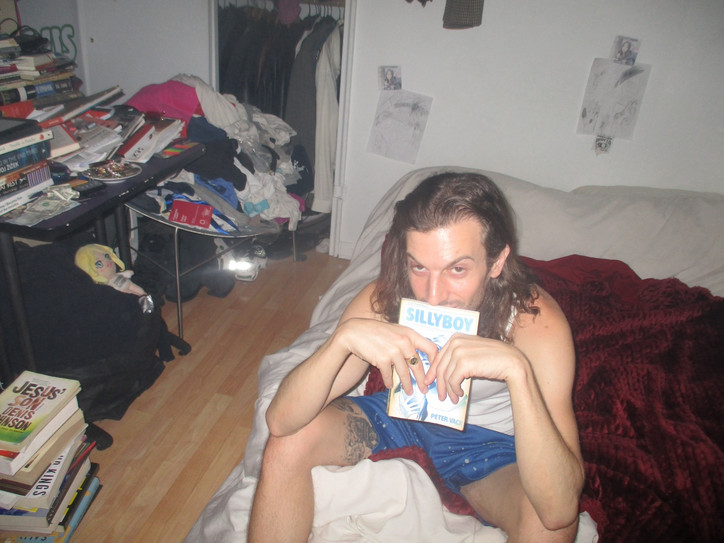
When did you write Sillyboy?
I began in 2015.
I wasn’t even in the city. I was in middle school.
Cat’s out of the bag — Sillyboy wasn’t actually about you. I started in 2015, but the bulk of it was written from 2017 to 2021. Jon Lindsay, who started Cash4Gold and put the book out, and Nathan Dragon made some great refining edits. It’s incredible how much it takes to tell the story you want.
And what’s the story you wanted to tell?
When I began writing, there wasn’t that much content about how the phone influences relationships. So the overarching thesis was about social media and Instagram.
Boomers are going to love this book.
I’m willing it into existence. The boomers will love this book. Actually, Harris, one of the editors at Cash4Gold, told me he sent it to his 75-year-old father, who loved it for some reason. So the boomers do love this book.
Now we’ve got work about social media, but at the time it was uncharted territory. And I still think there’s not enough. For as much as we’re on our phones, there isn’t as much media dedicated to portraying that reality as there should be.
People are making memes about how much your phone messes you up, but no one’s writing novels.
Memes exist because they’re native to the phone. But in literature and cinema, there aren’t that many voices being honest about how phones mess you up. So I was motivated by that in the beginning. I’d even joke that I wanted my book to mention Instagram more than any other book.
So much of what we consider culture is happening on the internet now. We had places like Max’s and CBGB as sites of cultural happenings. But now, lots of “culturally significant” interactions happen on the phone. Journalism nowadays is just people talking about what we’re seeing on the internet. The phone is such a cultural location now.
The book portrays a time when everything was a lot more 1.0. I’m writing with a real vintage Instagram in mind, partly because of how long it took me to write. But now, all of our innocence around social media has been lost. I still think it’s surprising how we don’t have much media about that reality — partially because it’s so hard to capture.
Because what are you going to do? Make a film about people angrily typing in bed?
This is the reality I try to portray in rachelormont. It’s really difficult to represent, but we have to. Or else all we’ll have is the phone. You won’t have any other cultural artifacts that reference reality. We won’t have any way of documenting it.
Even if it was fucked up that all we did was sit on our phones.
Honestly, documentation shouldn’t be about whether something is fucked up or not. Art just needs to reflect reality so we have some way of dealing with it. So many people are making things that are overly referential to the past to the point where we miss the present. I just want the book to be entertaining. It’s not even that deep.
You didn’t mean for it to be deep. It was only deep to me because I have a similarly fucked up love life.
All the depth comes from the reader.
That’s a better way of putting it.
But Chloe and Sillyboy do have that kind of relationship that’s kept together by, like…
How much they love to hate each other?
How much they love to hate each other. It’s compulsive. You’re actually seeing really deeply into the book. One thing I wanted to get at is how you can end up in a fully committed relationship with someone you’re not necessarily right for. Some relationships just have a volatile quality and it’s what makes them valuable. For Chloe and Sillyboy, it’s part of the way they show love — dumping each other constantly. That can become a compulsion in and of itself. Have you ever had anything like that?
No. I’ve been in like, three relationships.
It can be a thing that adds to the romance.
I mean, hate sex is a thing, so I think I get it.
Exactly. Constantly reinvigorating the hate sex — that’s the goal. They’re trying to hate each other more so that they can have better hate sex.
Cheers to that.
Fuck it. I will cheers to that. I do think these characters grow to really love each other, but it’s a romance predicated on lust. They met on OKCupid — the most unserious hookup style. There’s nothing substantial about the way they come together. It’s the opposite. It’s deeply surface-level.
It’s also very archetypal. A Scott Pilgrim relationship.
Explain.
Younger Asian chick and an older white dude with quesitonable morals who don’t have a reason to be together. That’s just the first thing I noticed. I felt a little read, honestly.
Because?
I’ve had a lot of Sillyboy-Chloe-style entanglements. I was texting you about all the parallels the whole time I was reading. Like, “Dude, an Asian girl tattoo artist who went to NYU reminiscing with the guys she used to skate with? That’s so freaky.”
It’s crazy that I wrote the book about you. [Laughs]
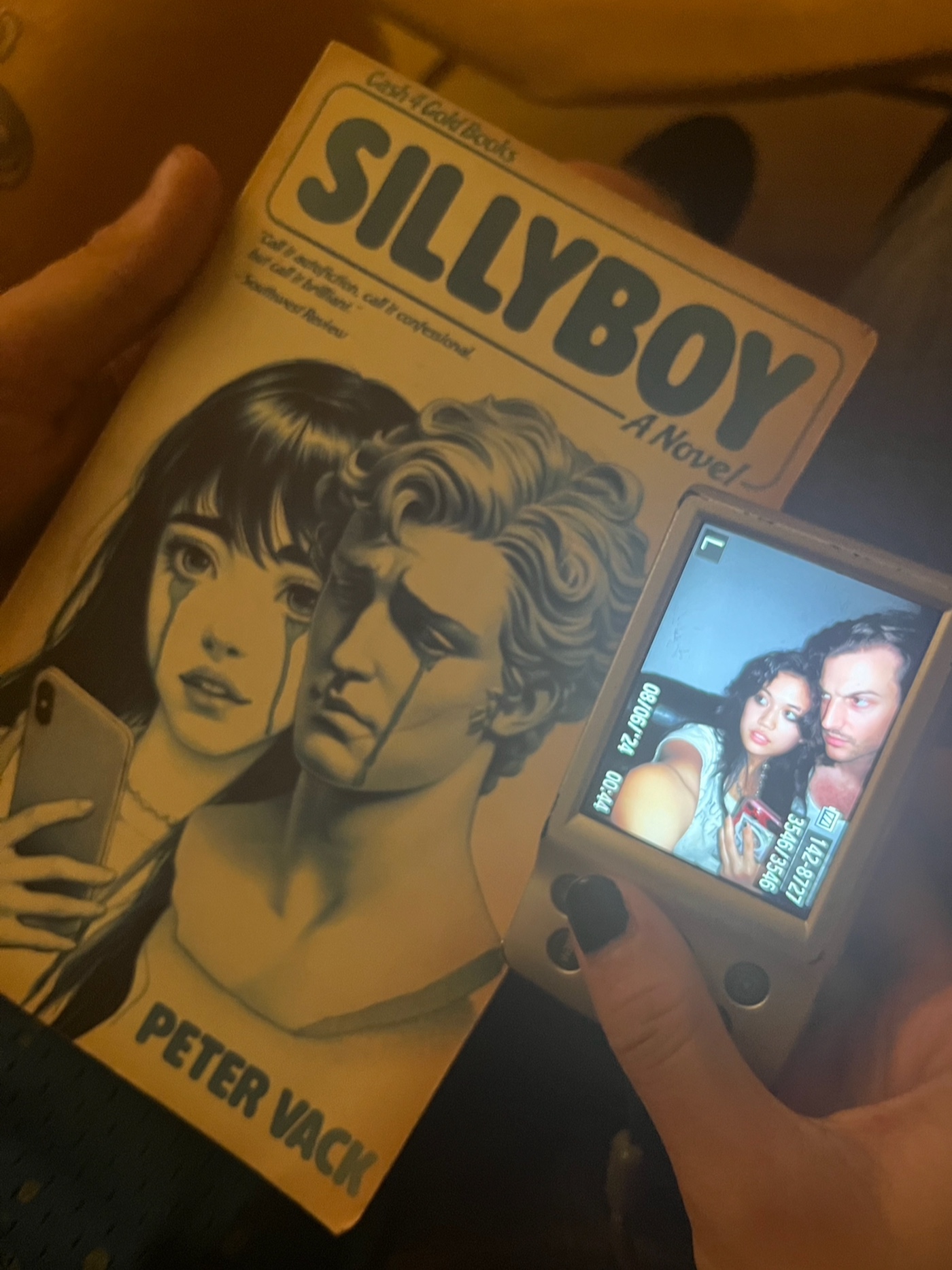
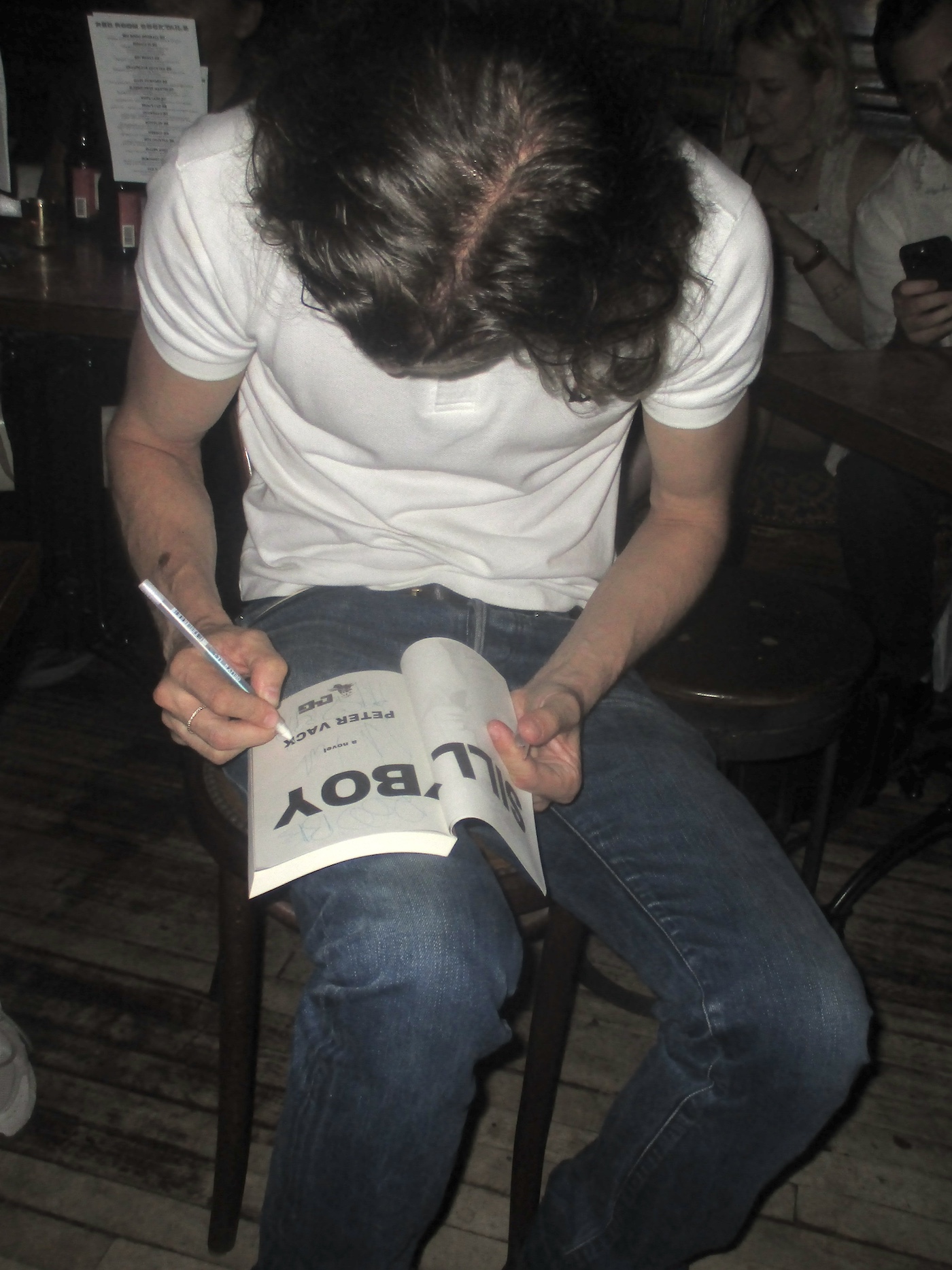
I want to do an interview where I tattoo someone and was kind of hoping it would be this one. But you’re pretty tatted up. Would you want to get more?
Just thinking about that would be like opening Pandora’s box. I can justify my obsession with memes because I know how to make them. I can’t justify my obsession with tattoos because I’m just a consumer of them.
That doesn’t mean you can’t be obsessed with them.
I like being involved in the creation.
But you don’t have to be literally stabbing the ink into yourself to be part of the creation. Tattooing is about collaboration. The artist and the client work on the design and placement together. I should teach you how to tattoo.
Did you do all of yours yourself?
Yeah. I’ve never been tattooed by another person.
Oh wow, that’s actually amazing. But it’s more natural for you because you’re more compelled to draw. I’m not a visual artist at all.
But you shot a bunch of movies. That has to count for something.
I’d like to think so, but drawing is different. I don’t have that level of discipline and I don’t want to acquire that skill. I love tattoos, but I really did only feel like a consumer, so I had to opt out of that obsession. Plus, as an actor, it’s such a transgressive move to get tattooed. I was so limited with where I could get them, so it was a doomed love affair from the start.
That’s sort of your thing lately, isn’t it?
It is my thing. Life itself is a love affair.
New York is a love affair that’s doomed from the start. I’m running out of money.
For me it’s different. Since I’m a hometown guy, even if I run out of money, I could just go live with my parents. It would be emasculating, but I’d be fine.
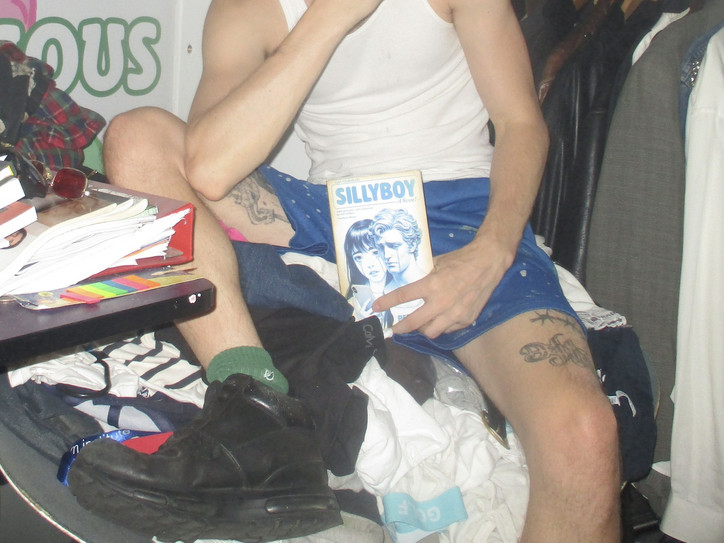
Talk to me about the epilogue. Why wasn’t it last?
It was a quirk. In the first draft, I wanted to be done before I was actually done. I just followed that instinct and was like, “I’m gonna write an epilogue now.” The process is always very instinctual and then going back and making it seem like it had some foresight.
But it worked for the book. That premature desire for the technical conclusion of the novel has some correlation to Chloe and Sillyboy’s relationship — it’s past its prime. It needs to be done but won’t end. The relationship goes on past its expiration, the book goes on past its epilogue.
What was with the stabbing scene? You don’t know it’s not actually happening until you’re finished with all the gore. The tonal shift from Future fanfic to familicide is really disturbing.
It was another moment that was highly collaborative between Jon and I. I could reveal how that scene came to be, but that might ruin some of the mystery. There’s just so much unprocessed anger — a lot of it Oedipal. Spoiler alert, Sillyboy is about some of the more “toxic” parts of masculinity. I think we’ve put men in a bit of a straight-jacket. I think men need a place to read and acknowledge aspects of masculinity that aren’t so acceptable, and then figure out how to deal with them. And part of the unspoken message of this book is a release valve for men to read a protagonist that’s upfront about some of their more problematic impulses.
There’s this other reason I was thinking about Scott Pilgrim — because we have a main character who isn’t necessarily a good person.
Well, what makes a good person to you?
You do always say that provocateurs make the world go around.
They do. Even if reading a character from a voice that you don’t agree with just makes you more convicted in your views, that’s great. But I see this impulse to flatten everybody into the same ideology, and I think it’s really dangerous. No one would even like that. Without discourse, there wouldn’t be any interesting culture. There wouldn’t be fruitful discussions. And I don’t think it’s a world anybody should sign up for.
Speaking of discourse, I hear we had beef before we met. You thought I was some white dude?
I read like, the first sentence of that blurb you wrote about my poem and thought you were a hater so I dismissed you as some sort of white guy.
Probably because I compared you to the monkey in the Apple store.
To be clear, when I actually read it, I wasn’t surprised when you were a cool girl. I don’t think you were a hater at all. It’s interesting that we met each other as writers.
Especially when you’re an actor first. That’s like, your thing. You’re the best at acting, right?
I’d like to think so, but maybe I’m delusional.
What have you had the most commercial success in?
Definitely acting. But commercial success doesn’t mean I’m the best. Honestly, I put more hours into writing than acting. You become a writer. You don’t just become an actor.
You’re an actor when you’re a blank slate.
There’s a deep irony in the title, because acting isn’t really an active job. There are a lot of actors that create their own opportunities — Sylvester Stallone wrote Rocky. But most of the time, as an actor, you have reps who hunt down work for you. It’s a passive job. You can control your destiny as a writer and filmmaker, and that’s why I put so much effort into it. I truly believe I’m best at acting. But you can’t just become an actor. That’s what’s so difficult. You’re just a plaything of fate.
When you’re acting, all the actions that you’re doing are written by someone else.
That’s the deeper level of that passivity. The script is never yours — which is something I couldn’t handle. Even though I’ve been acting since I was a kid, I’ve put more hours into writing. I realized I wasn’t cut out for a job I had no control over.
That’s your thing about tattoos.
You’re noticing a theme here.
I do that sometimes.
Writers notice things. That’s why I love writers. Honestly, non-writers let the world pass them by without taking it in. But that’s the actor in me. When I love something, I want to participate in it. I love literature so I made a book. Same thing with film.
Some of my critics have said I’m a dilettante but I think that’s beautiful. Of course I’m a dilettante. A dilettante is someone who does a lot of things, but not very seriously. And I think that’s awesome. But what about someone who takes a lot of things very seriously? That’s what describes me. You know how it’s “jack of all trades, master of none?”
You’re trying to be “master of all.”
You can't really be a master of all.
I'm just trying to make a saying.
No, it's beautiful. I'm just going with your saying. The truth is, I wonder if there are any masters anymore. We’re forced to be jacks of all trades.
I’m a master of something.
You are? Of what?
Master-baiter.
Oh yeah, dog.
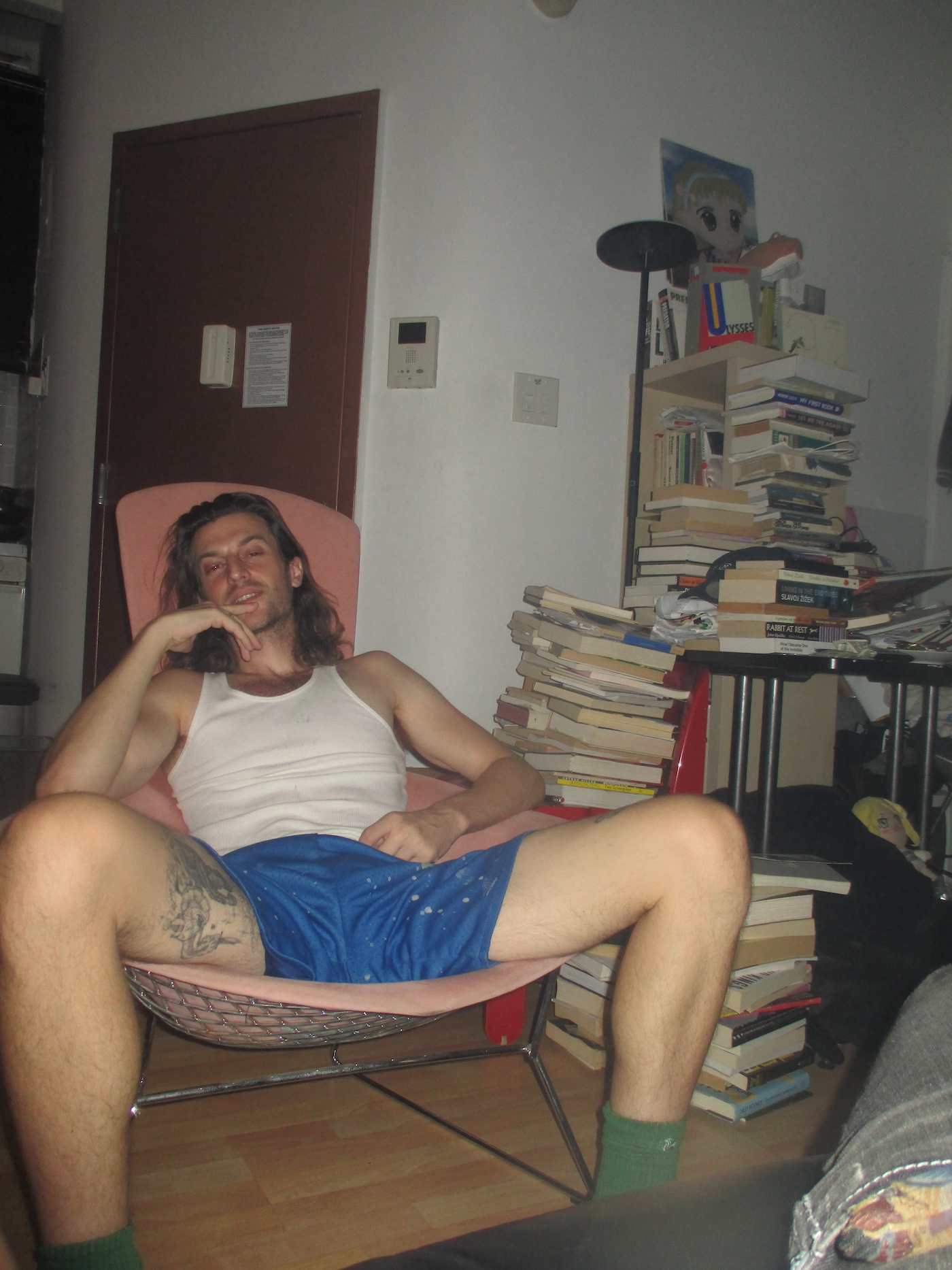
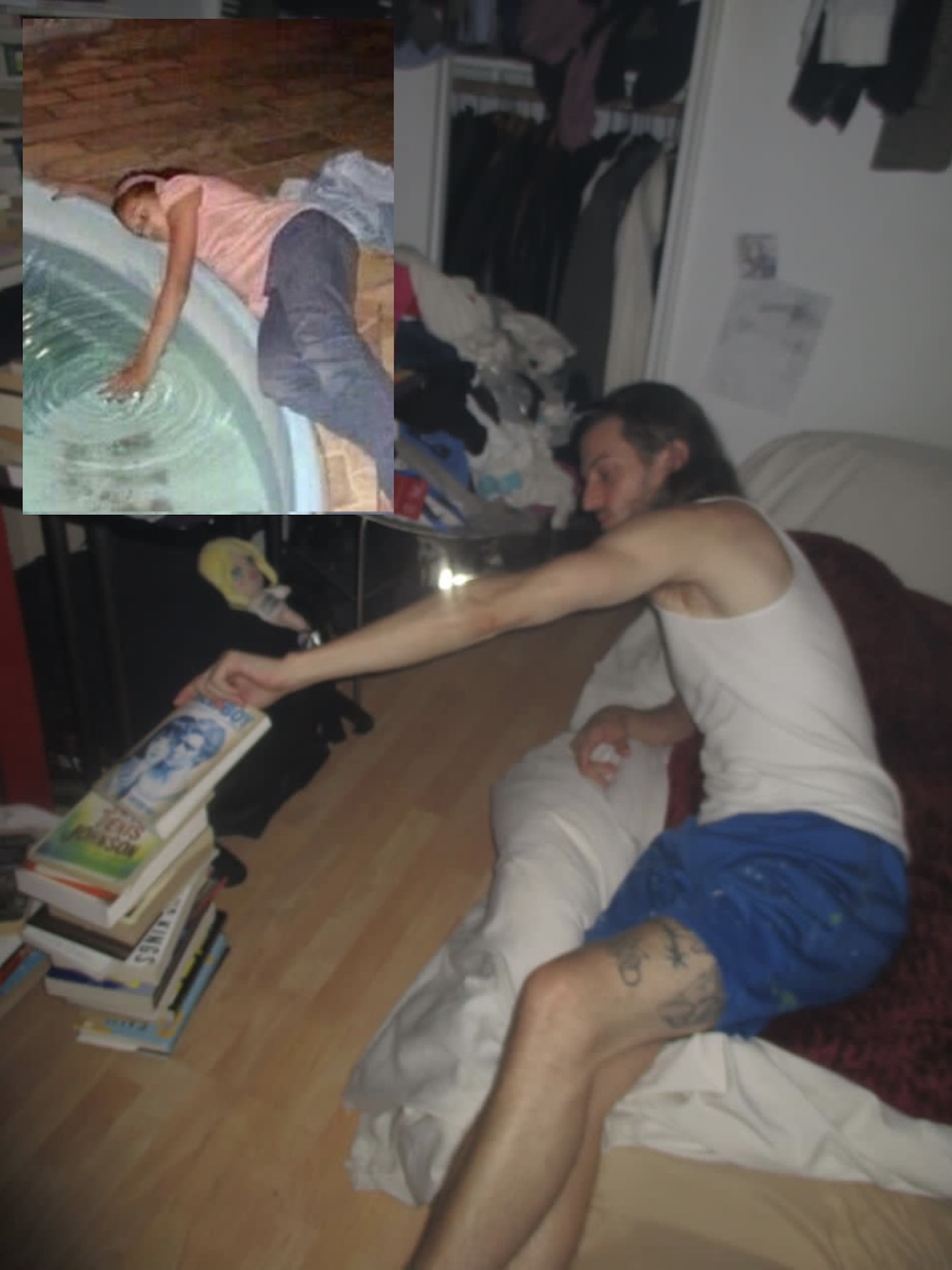
I don’t masturbate anymore.
Really?
Not at all.
That’s insane.
I’m like, anti-gooning. Isn’t that crazy?
If you’re anti-gooning, where’d the username come from?
Honestly, from what we were just talking about. I was lamenting about how I have too many interests to become a master in any of them, and I was like, “I’m a jack of all trades, master of none. Master of cum.” It was in 2017 when cum memes were trendy. I mean, they’re always trendy, but that might’ve been their debut. But they’re totally canonical now.
I actually never actually write about cumming on the internet or even in the book. Cum isn’t actually that much of a theme for me in memes. I don’t even make memes about cum. Its’s just funny because language is so malleable — you don’t have to use language against yourself by calling yourself ‘The Master of None.’ You could exhibit some jouissance and be the fucking master of cum. And I was like, “That’s a funny thing to say in my Instagram bio,” because I didn’t have a meme account at the time.
You were memeing on main?
I was memeing on main. I was doing weird performance art shit from the beginning.
Also, about the gooning thing, I just wanna say — it’s not like the main event isn’t occurring. I’m just…not practicing. The main event is definitely happening. I’m just not doing all this rehearsing. I needed to flex that. I know that that’s extremely juvenile.
I mean, look at who you’re talking to.
You’re always flexing stuff on me like that.
What? I was just talking about how I’m also extremely juvenile.
No, I just mean that you’re open about a lot of stuff. Which is good.
I mean, I have no problem sharing that type of shit, but if you ask me about something like, my relationship with my mom, then we might have a problem.
I haven’t done that yet.
Please don’t.
Based on the way you handled that question, I already have an answer.
I was half-joking about my mommy issues.
You’re not. No, no, no. You’re saying this to a Freudian. There are no jokes. You’re literally laying down on my couch like you’re in analysis, and I’m sitting up like I’m an analyst.
Oh god. I need to sit up.
And you just realized that and bolted up out of the position—
Well yes—
Because of how true it was!
No!
I’m going to take everything you say in that posture very seriously.
That was damning. That was brutal.
No, are you kidding me? You can say anything to me.
I appreciate that. But I came here to interview you and ended up laying down on your couch getting tricked into talking about my feelings.
And that’s awesome.
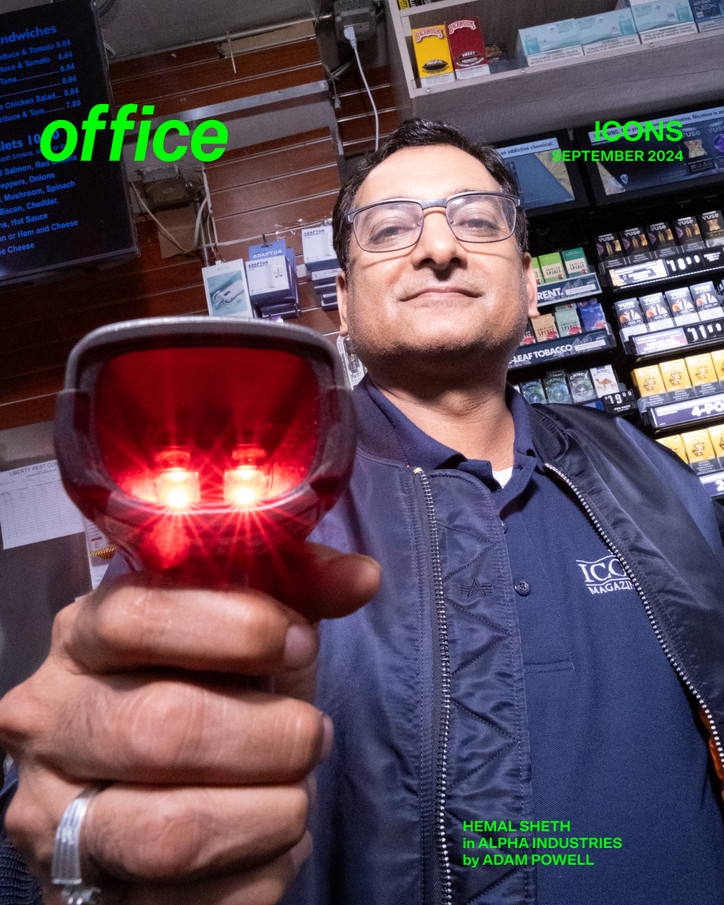
How did you start running Iconic Magazines?
In 1993, as soon as I came over [to New York] from India, my uncle had a store, and I started working with him. That location was on the Lafayette and Spring Street corner. I took over this location [on Mulberry] in 1995. That's where my journey started. I built [another location] in 2011, and that location was closed in 2014, so I moved [back] here on Mulberry again that year.
Could you tell us about some of your favorite magazines?
I usually like arts, fashion, and design. There are plenty of those. Architectural Digest and Cabana are some of my favorites. British Vogue is good. I like i-D magazine, but I'm out of that, and waiting for the next issue. Dazed is a nice magazine too. Purple, that's like a coffee table book. Same thing with Self Service. The Gentlewoman, that’s a good magazine for fashion. Also Homme Girls — it's been about five, six years that it's been on the market. I like Apartamento — great for home design. Of course, office magazine is one of my favorites. I’ve been [distributing] office for over ten years now. One-of-a-kind magazine.
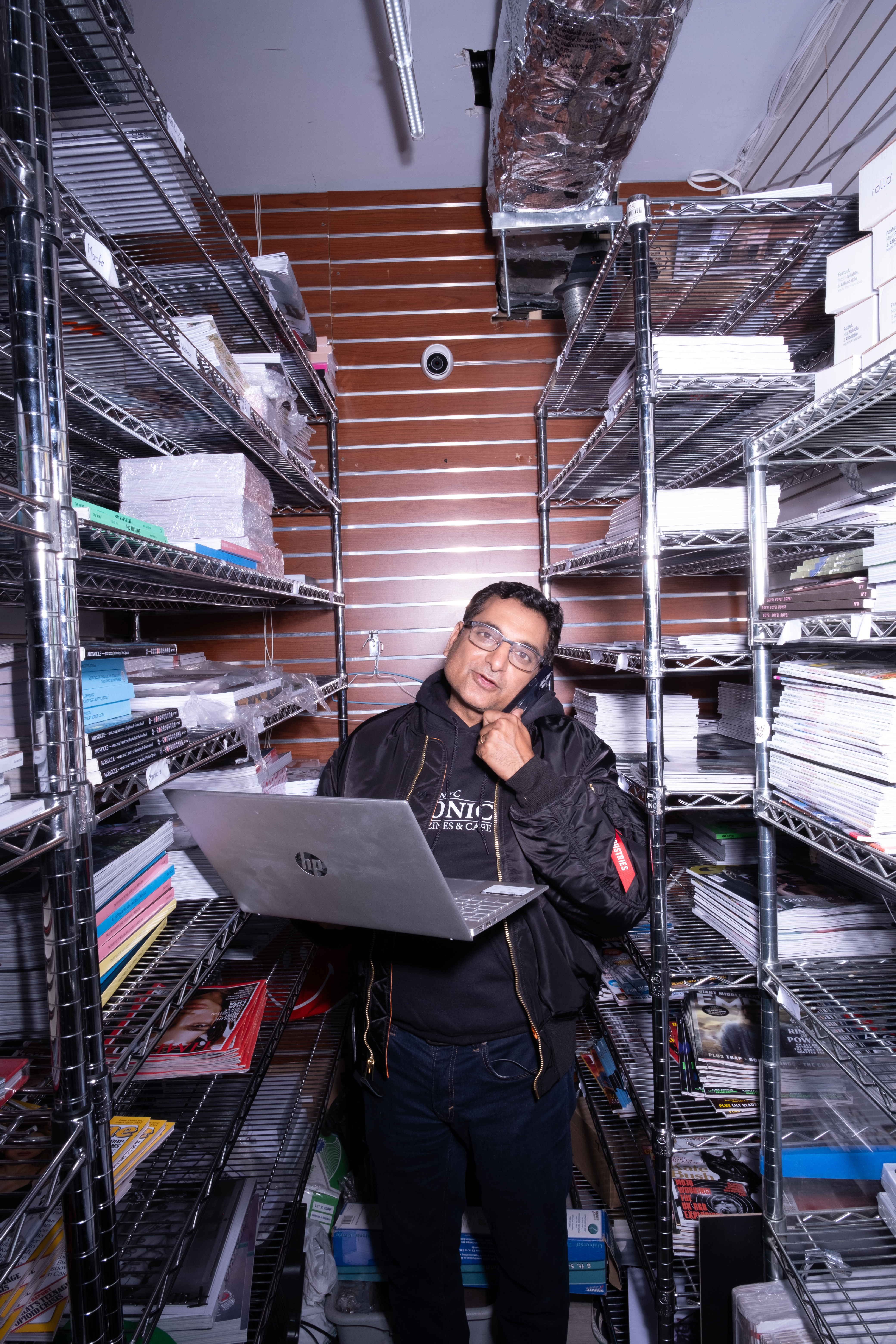
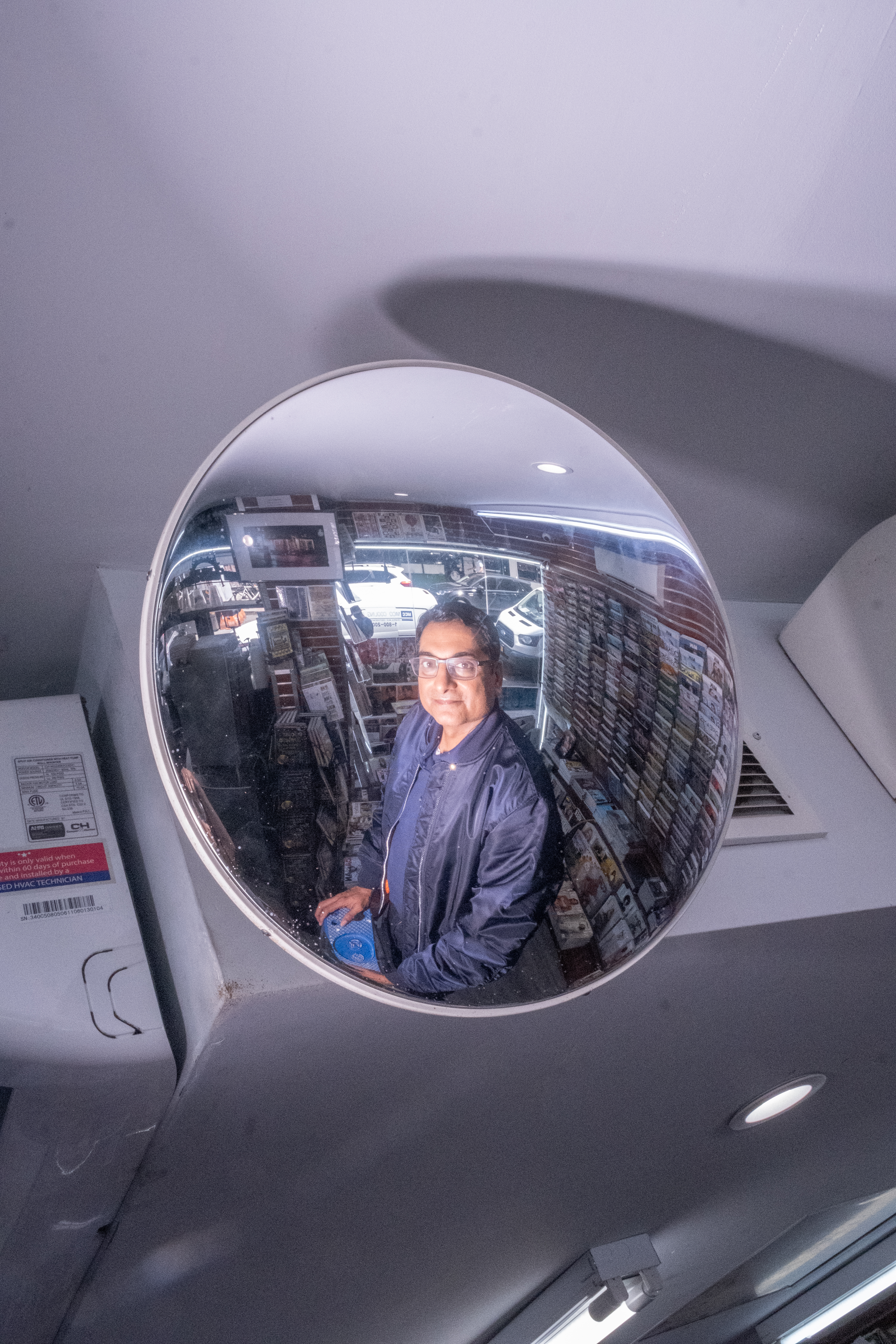
LEFT: HEMAL wears MA-1 HERITAGE BOMBER JACKET by ALPHA INDUSTRIES, HOODIE by ICONIC MAGAZINES, PANTS and SHOES are TALENT’s OWN
RIGHT: HEMAL wears MA-1 HERITAGE BOMBER JACKET by ALPHA INDUSTRIES, SHIRT by ICONIC MAGAZINES, PANTS are TALENT’s OWN
How did you develop a passion for magazines? Where did that passion come from?
From my childhood, I loved reading, always — I believe since I was about 7 or 8 years old. Unfortunately, I don't have that much time now, but I used to read a lot. When I took over my first business, there were not that many magazines [in the store], and I started getting more magazines and customers liked it, and I started liking it.
What would you be doing if you weren’t running these stores?
If I was not involved in the business from the beginning [after arriving in America], my goal was to do the masters in software engineering. Once I was involved with the magazines, I loved doing those things, so I never looked back from there.
Do you have any rituals?
It's basically the same routine 99% of the time. I’m an early bird. I wake up around 4:30 or 4:45 in the morning. I do my prayer. After I finish my prayer, I start my work.
What are your favorite places in New York?
Definitely Iconic Magazines. That's my favorite space. Also SoHo and the West Village, I like to be there. All the fashion designers, good people, nice crowd. All the unique stores are there, and it's inspiring.
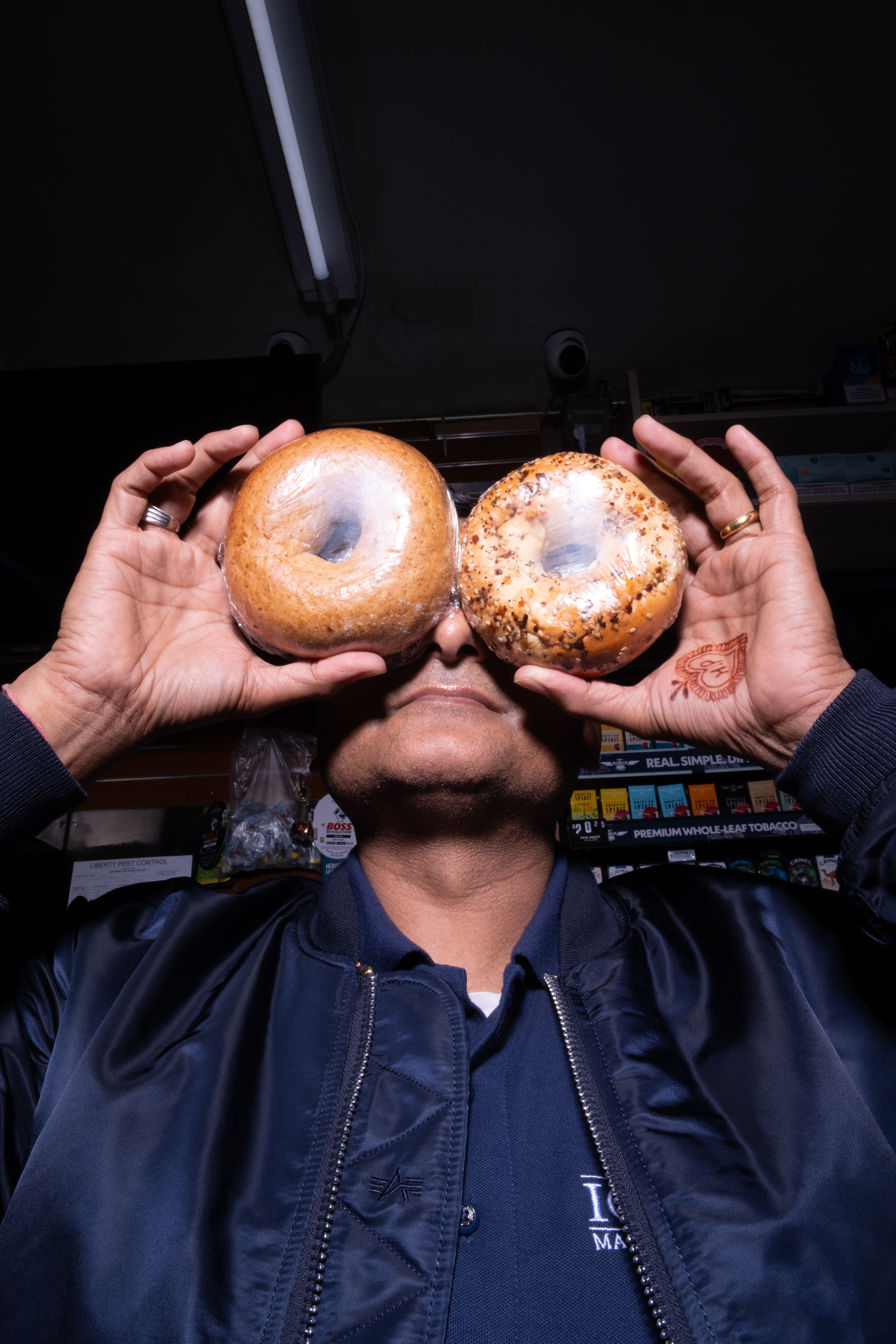
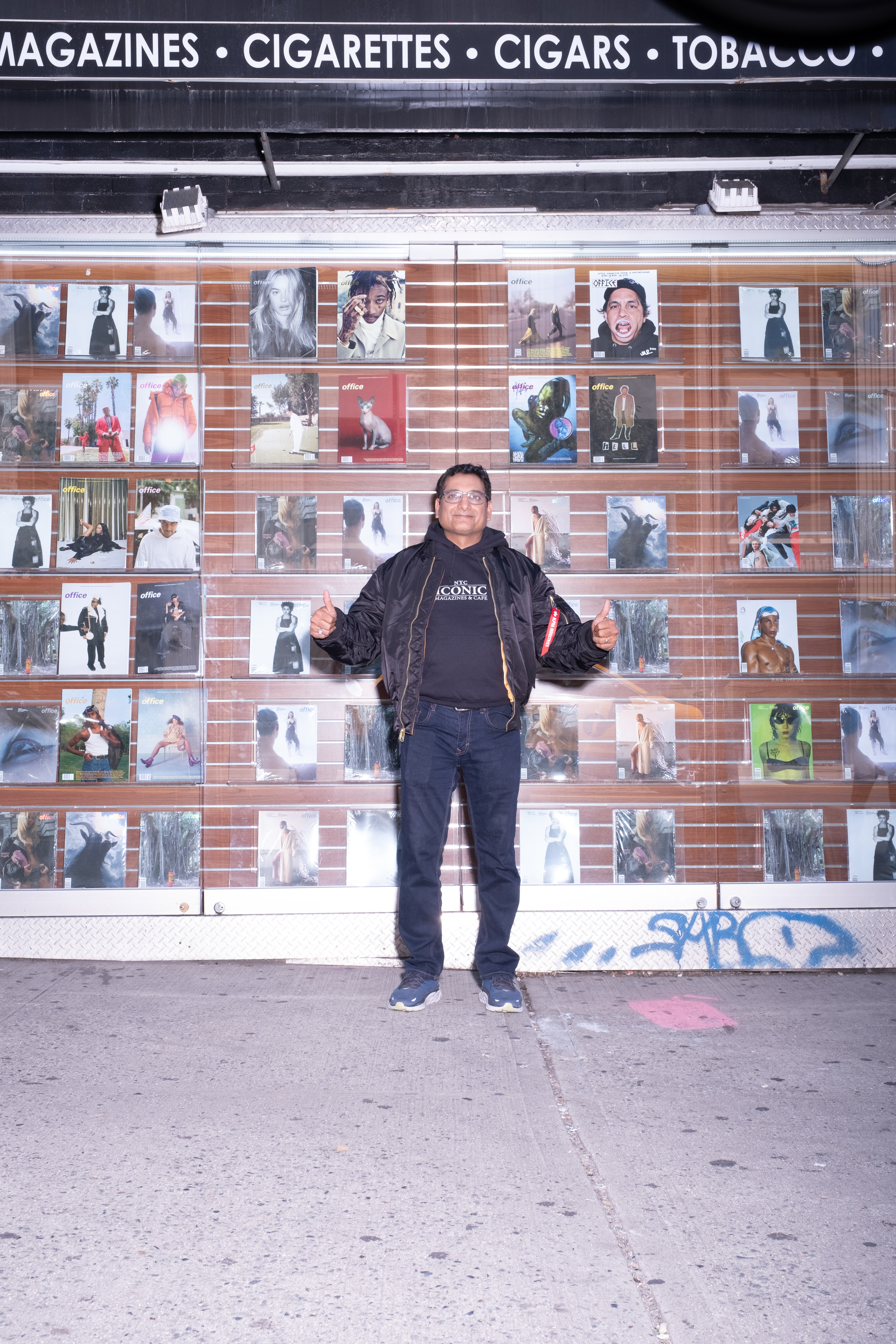
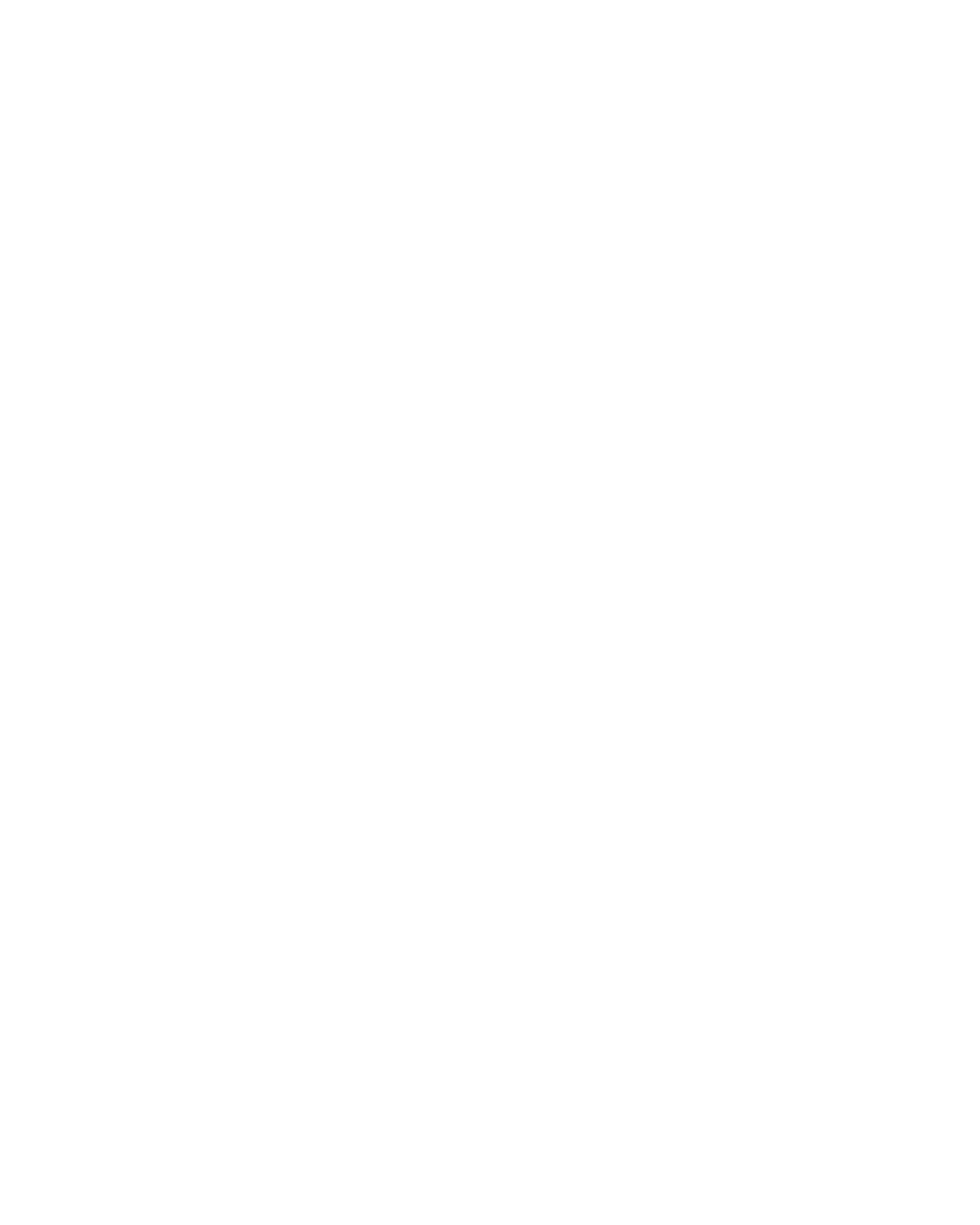
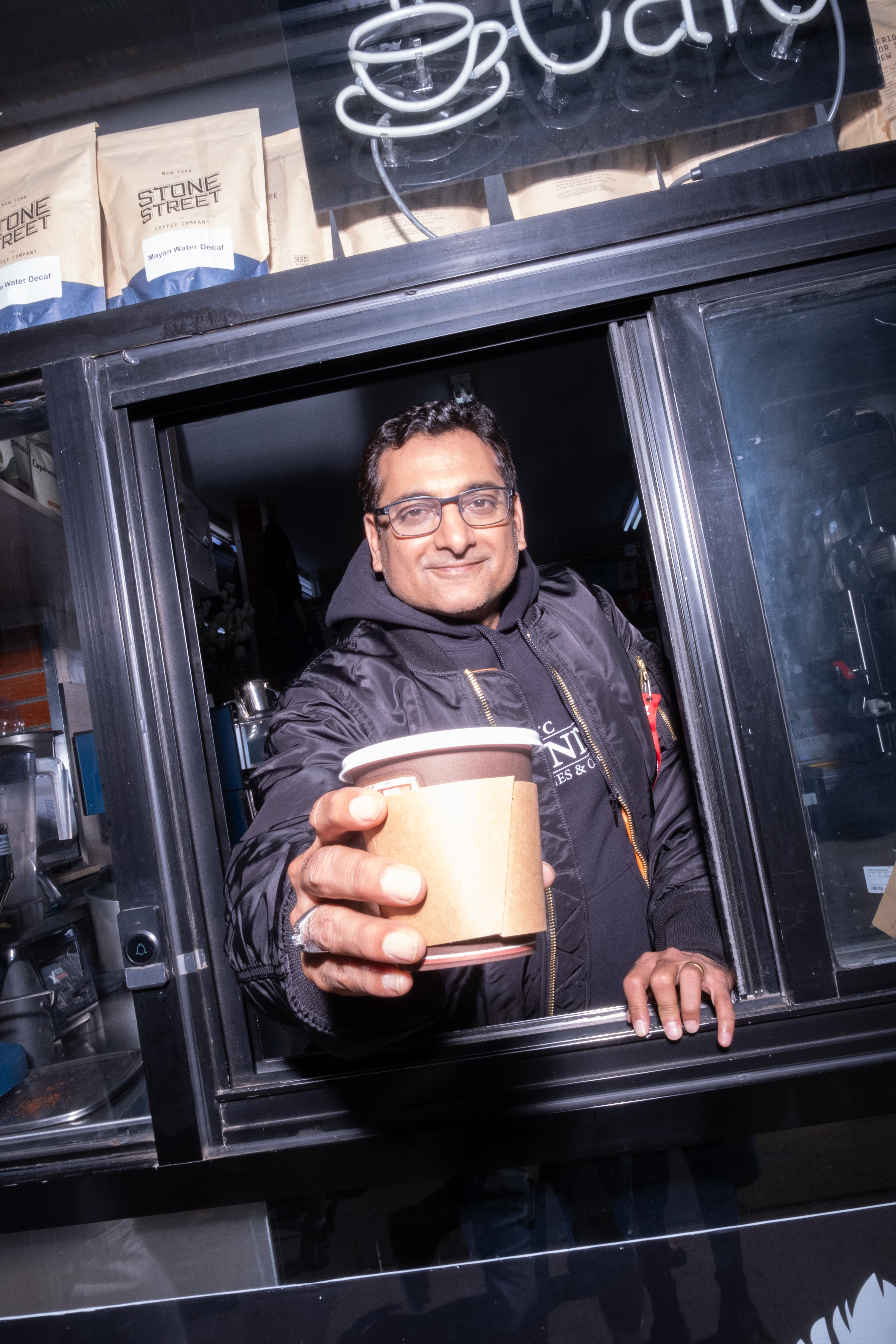
Do you remember the first magazine you ever read?
At the time I was back in India, so I don't remember which one it was, to tell you the truth. But my dad used to buy them a lot for me, and that’s how I got into it.
What is the rarest magazine you've ever stocked in the store?
Frank Ocean, he had his first book, Boys Don’t Cry. That's a one-of-a-kind magazine, the rarest magazine that we’ve had in the store. He did his magazine launch in our store, in Iconic. Only one [issue] came out.
What do you hope for the legacy of Iconic Magazines to be?
I like people to have fun, to come and have a great experience shopping. I wanted to create this atmosphere and space for the people, so customers can come and enjoy a great selection of magazines. That was my goal, and I am still working towards that, to have one of the best magazine stores in the country.
